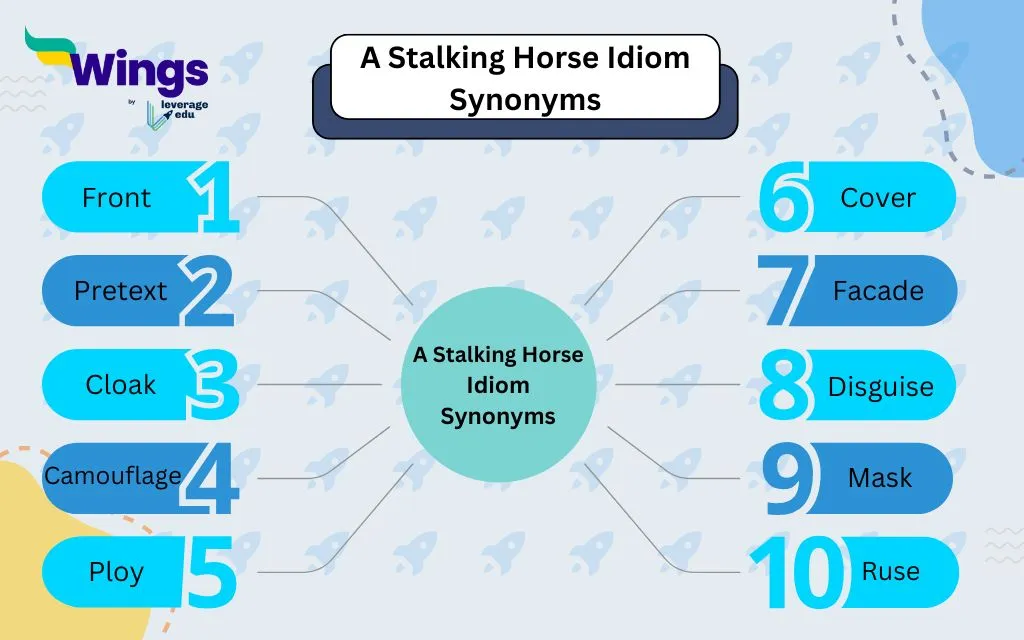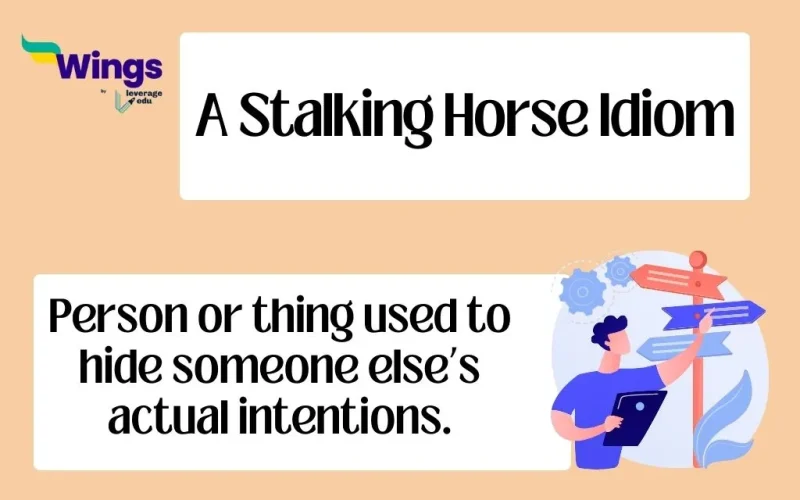The idiom “a stalking horse” in English Grammar denotes a person or thing which is used to hide someone else’s actual intentions. Moreover, it also means to provide cover for the ulterior motives of another person. For example, in a game of chess, your opponent sacrifices a minor piece to distract you all the while preparing for a more decisive move; this shows the concept of using a stalking horse. Read on to learn more about the A Stalking Horse Idiom, its meaning, origin, synonyms, usage in sentences and a quick quiz to test your understanding.
Best Idioms with Examples and Meanings
This Blog Includes:
A Stalking Horse: Meanings, Origin and Examples
As you have already learned, the idiom “a stalking horse” refers to a well-thought-out manoeuvre where someone or something is used to divert attention or test the waters for a more substantial, secret agenda. For example, the professor gave a controversial theory as a stalking horse, hence flaring discussions that eventually led to more in-depth insights into the topic.
In the world of politics, the idiom signifies a decoy candidate who runs for a position they know they cannot win. Furthermore, they do this to confuse the other side or draw attention away from someone else the other side wants to lose. For example, the new policy proposal was merely a stalking horse, devised to distract the opposition while the government pushed through more controversial reforms.
When it comes to the origin of “a stalking horse” idiom, it emerged in the early 16th century from an old hunting method. Hunters would hide behind a trained horse to get closer to their target birds without scaring them away. Moreover, the horse acted as a cover, thereby allowing the hunter to get close enough to shoot.
Also Read: Idioms for Surprise
A Stalking Horse Idiom Example Sentences
After getting through with the meaning and origin of the idiom “a stalking horse” here are 5 example sentences of the idiom so that you can understand how to use it.
- The small coalition was just a stalking horse for the company’s larger takeover plans.
- The candidate running for governor is believed to be a stalking horse for the current minister.
- The initial low offer was a stalking horse to get the other side to disclose their bottom line.
- The proposed shopping hub is a stalking horse for the developer’s real intention to make high-rise apartments.
- The frivolous lawsuit was a stalking horse to gather information about the company’s finances.
Also Read: Idioms for Hard Work
Synonyms of A Stalking Horse Idiom
After understanding the meaning and usage examples of the idiom, here are synonyms which convey the idea of people or things being used by someone else to hide their true intent.
| Smokescreen | Trojan horse |
| Deception | Smoke and mirrors |
| Red herring | Masquerade |
Below we have compiled an infographic which enlists some more synonyms of a stalking horse idiom which you can use.

Explore more exciting Synonyms below!
| Synonyms of Gratitude | Synonyms of Environment |
| Synonyms of Beauty | Synonyms of Believe |
| Synonyms of Future | Synonyms of Death |
A Stalking Horse Idiom Quiz
After you have gone through all the details related to the ‘cheek by jowl’ idiom, it is time to test your learning with the help of this quiz.
- The charity event was _____________ for the politician’s campaign for office.
A) sheathe
B) backing
C) A stalking horse
D) Guise
- The proposed environmental regulations were ____________ for the industry’s desire to increase prices.
A) Good
B) A stalking horse
C) Reasoning
D) Dismiss
- The small grocery store was merely _______________ for the larger supermarket chain planning to move in next year.
A) Cover-up
B) Stepping stone
C) A stalking horse
D) Front runner
Here are your answers!
- C) A stalking horse
- B) A stalking horse
- C) A stalking horse
Check Related Reads on Proverbs, Idioms and Synonyms!
FAQs
An example of “a stalking horse” in a sentence is “The small alliance was just a stalking horse for the organisation’s bigger seizure objectives.”
An example of a stalking horse is “The suggested shopping hub is a stalking horse for the designer’s true intent to construct huge bungalows for the rich.”
A synonym for stalking horse is “masquerade.” Moreover, some other synonyms are smokescreen, trojan horse, deception and red herring.
It is called a stalking horse bid because it is named after the hunting tactic where hunters hide behind a horse to approach prey unseen. In the business world, it refers to an initial bid for a bankrupt company’s assets, hence acting as a decoy to attract other bidders and set a minimum price.
A stalking horse candidate is a person who runs for a position with little chance of winning, usually to divert attention from another candidate or to test the waters for a likely bid.
A stalking horse method is when an initial offer is given to purchase a bankrupt company’s assets. This sets a baseline price for the assets, hence prompting higher bids from other possible buyers.
In philosophy, a stalking horse is a person or thing that can be used to test a concept or challenge something on behalf of a third party.
This was all about the A Stalking Horse Idiom. You can also follow the Learn English page of Leverage Edu for more exciting and informative blogs related to English grammar and the English language.


 One app for all your study abroad needs
One app for all your study abroad needs












 60,000+ students trusted us with their dreams. Take the first step today!
60,000+ students trusted us with their dreams. Take the first step today!